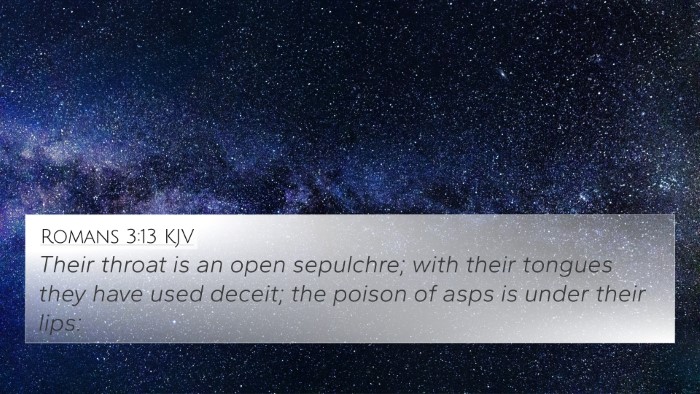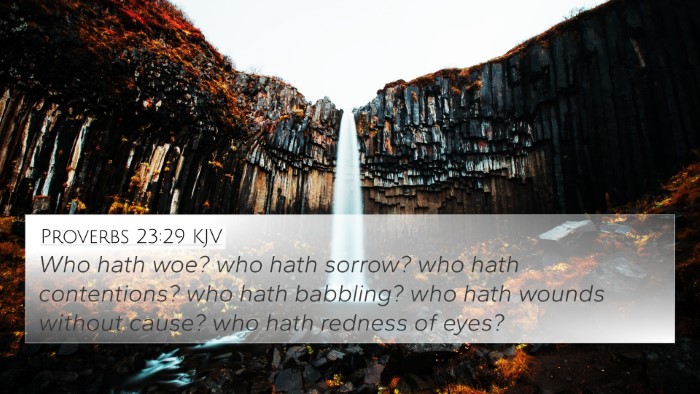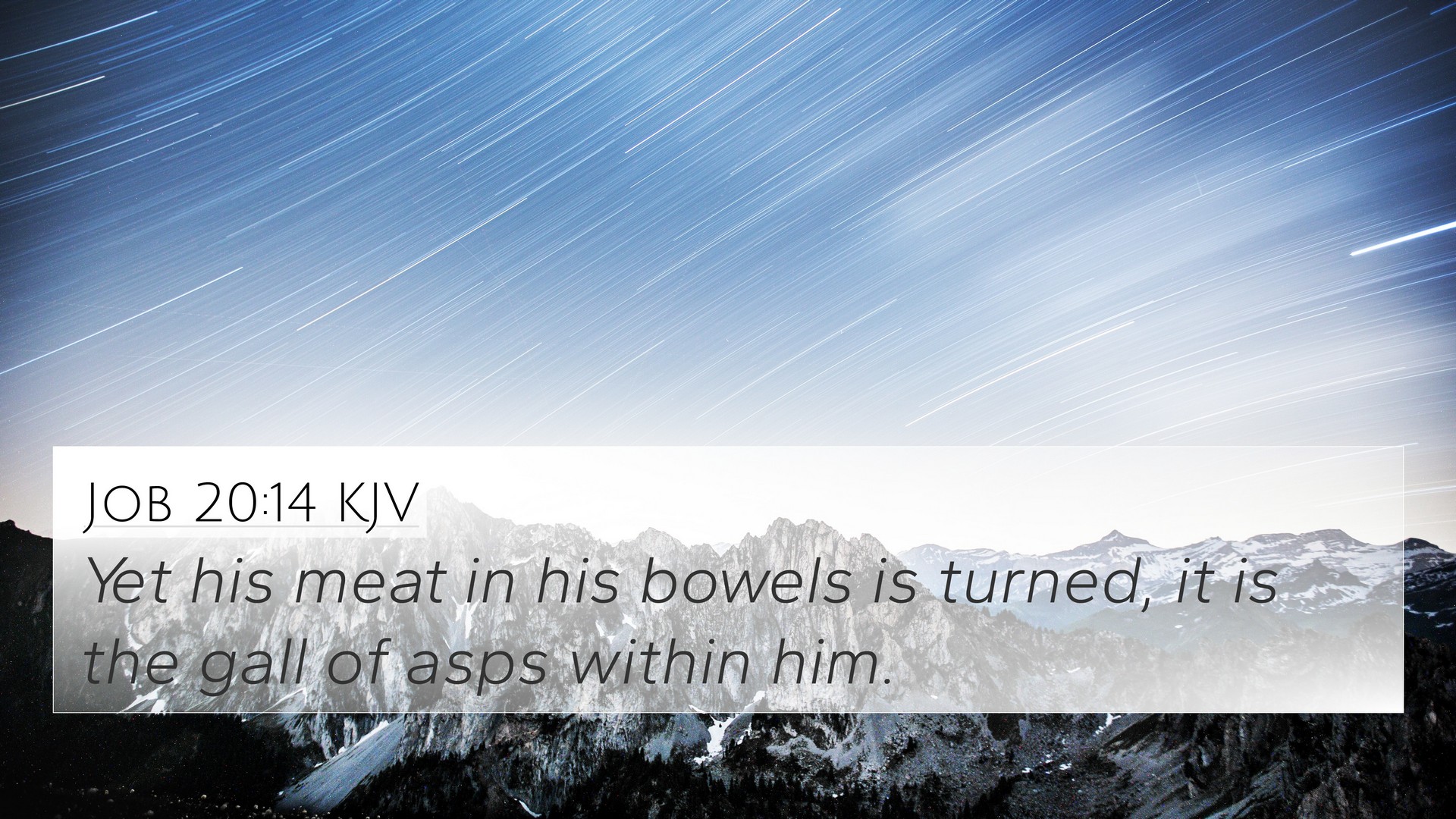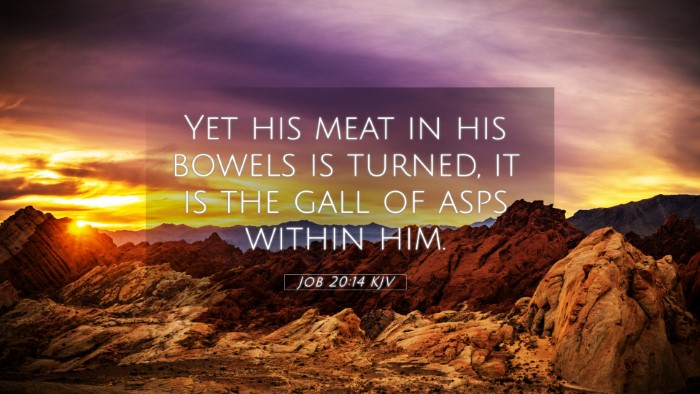Old Testament
Genesis Exodus Leviticus Numbers Deuteronomy Joshua Judges Ruth 1 Samuel 2 Samuel 1 Kings 2 Kings 1 Chronicles 2 Chronicles Ezra Nehemiah Esther Job Psalms Proverbs Ecclesiastes Song of Solomon Isaiah Jeremiah Lamentations Ezekiel Daniel Hosea Joel Amos Obadiah Jonah Micah Nahum Habakkuk Zephaniah Haggai Zechariah MalachiJob 20:14 Similar Verses
Job 20:14 Cross References
Yet his meat in his bowels is turned, it is the gall of asps within him.
Uncover the Rich Themes and Topics of This Bible Verse
Listed below are the Bible themes associated with Job 20:14. We invite you to explore each theme to gain deeper insights into the Scriptures.
Job 20:14 Cross Reference Verses
This section features a detailed cross-reference designed to enrich your understanding of the Scriptures. Below, you will find carefully selected verses that echo the themes and teachings related to Job 20:14 KJV. Click on any image to explore detailed analyses of related Bible verses and uncover deeper theological insights.

Romans 3:13 (KJV) »
Their throat is an open sepulchre; with their tongues they have used deceit; the poison of asps is under their lips:

Malachi 2:2 (KJV) »
If ye will not hear, and if ye will not lay it to heart, to give glory unto my name, saith the LORD of hosts, I will even send a curse upon you, and I will curse your blessings: yea, I have cursed them already, because ye do not lay it to heart.

Jeremiah 2:19 (KJV) »
Thine own wickedness shall correct thee, and thy backslidings shall reprove thee: know therefore and see that it is an evil thing and bitter, that thou hast forsaken the LORD thy God, and that my fear is not in thee, saith the Lord GOD of hosts.

Proverbs 1:31 (KJV) »
Therefore shall they eat of the fruit of their own way, and be filled with their own devices.

Proverbs 23:29 (KJV) »
Who hath woe? who hath sorrow? who hath contentions? who hath babbling? who hath wounds without cause? who hath redness of eyes?

Psalms 51:8 (KJV) »
Make me to hear joy and gladness; that the bones which thou hast broken may rejoice.

2 Samuel 12:10 (KJV) »
Now therefore the sword shall never depart from thine house; because thou hast despised me, and hast taken the wife of Uriah the Hittite to be thy wife.

2 Samuel 11:2 (KJV) »
And it came to pass in an eveningtide, that David arose from off his bed, and walked upon the roof of the king's house: and from the roof he saw a woman washing herself; and the woman was very beautiful to look upon.

Deuteronomy 32:24 (KJV) »
They shall be burnt with hunger, and devoured with burning heat, and with bitter destruction: I will also send the teeth of beasts upon them, with the poison of serpents of the dust.
Job 20:14 Verse Analysis and Similar Verses
Understanding Job 20:14
Job 20:14: "Yet his meat in his bowels is turned, it is the gall of asps within him."
This verse is a part of Zophar's speech to Job, expressing the transient nature of the prosperity of the wicked. To comprehend the depth of its meaning, we can draw insights from notable public domain commentaries.
Commentary Insights
Matthew Henry's Commentary:
- Henry emphasizes the metaphorical meaning of the "gall of asps," signifying bitterness and suffering that lie beneath a seemingly prosperous exterior.
- He argues that this verse encapsulates the fleeting joys of the ungodly, suggesting they are ultimately filled with despair and dissatisfaction.
Albert Barnes' Notes:
- Barnes connects this verse to the overarching theme of retribution in the Book of Job, indicating that while the wicked may appear to prosper, their end is filled with anguish.
- His interpretation enhances the notion that the inner turmoil of the wicked is a stark contrast to their outward success.
Adam Clarke's Commentary:
- Clarke elaborates on the choice of "asps" as symbolism for extreme poison and danger, indicating that the pleasures of the wicked are laced with venom.
- He suggests that true contentment cannot be derived from sinful or unjust means, reinforcing the moral lessons found in Job's narrative.
Related Bible Verse Cross-References
This verse relates to various other scriptures that delve into similar themes of wickedness and divine justice. Here are some notable cross-references:
- Psalm 73:17-20: Discusses the fate of the wicked and the fleeting nature of their apparent success.
- Proverbs 1:32: Highlights the consequences of choosing a life led by folly and wickedness.
- Jeremiah 17:11: Reflects on the deceptive nature of riches that bring sorrow.
- Ecclesiastes 8:14: Talks about the injustice observed where the wicked seem to thrive while the righteous suffer.
- Romans 2:9: Connects suffering with the actions of the wicked both in this life and the next.
- Matthew 7:13-14: Observes that the path to destruction is broad and frequented, just as the pathway to life is narrow and rare.
- James 5:1-3: Alerts the rich, warning them of the miseries to come due to their unjust gains.
Thematic Connections and Interpretations
The themes emerging from Job 20:14 invite a comparative analysis of Biblical texts that discuss the temporary nature of worldly riches and the ultimate fate of the wicked:
- Transience of Earthly Riches: Many texts emphasize the temporary nature of wealth, reflecting Job 20:14's emphasis on inner bitterness despite outward prosperity.
- The Nature of Divine Justice: Job 20:14 serves as a reminder that divine justice prevails, which can be echoed in teachings found in Romans and James.
- Moral Lessons About Wickedness: The moral consequences of living unrighteously are reiterated throughout the wisdom literature of the Bible.
Using Bible Cross-References for Deeper Understanding
Employing cross-references is an invaluable tool for those studying the Bible. Here’s how:
- Utilize a Bible concordance to locate similar verses and themes.
- Engage in comparative Bible verse analysis to investigate how different scriptures interact and support one another.
- Employ a Bible cross-reference guide to facilitate study sessions focused on interrelated topics.
- Consider Bible chain references to explore thematic connections between the Old and New Testaments.
Conclusion
In summary, Job 20:14 encapsulates a profound lesson about the nature of prosperity and its inherent emptiness when grounded in wickedness. Through the lens of various public domain commentaries, we uncover deep insights that remind us of the ultimate purpose and justice of God.
By engaging with scriptural cross-referencing, believers can enhance their understanding of the interconnections that exist within the Biblical narrative, allowing for a richer and more integrated interpretation of their faith. This approach not only aids in comprehending individual verses but also sheds light on the overarching themes that unify the scripture.






